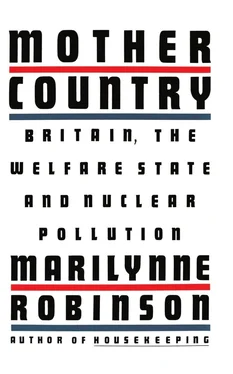I know I will shock my readers with my speculations. But more is at stake than their goodwill, though I value approval as heartily as anyone. The fact is that the role the British government has imposed on the country is not finally compatible with its survival. The functions the other Europeans have allowed it to assume are not compatible with their own survival, ultimately. And in the long term, the health of the planet is severely compromised, at very best.
Is there any reason to believe the British are entirely exceptional in adopting such strategies of self-destruction? None that I know of. It seems probable to me that other methods, just as outlandish and unthinkable, for scraping together a few billion dollars in contempt of everything we take to be of value are flourishing in other regions, eluding our notice because the world’s calamitous history has not alerted us yet to the profoundly destructive tendencies of this sad species. We are still naive enough to believe that there is a difference between peace and war, in terms of their impact on the environment and on human prospects for survival. Clearly, if the world is to be preserved, our thinking must change altogether, to take account of phenomena which lack even the abysmal logic of war. We must look at ourselves, and at those we trust and admire, assuming nothing on the basis of such notions as “Western,” or “advanced,” or, for that matter, “Third World” or “socialist.” There are many people of goodwill ready to take action against destructive forces where they perceive them. But Sellafield, the plutonium factory, which gathers radioactive material from the ends of the earth and then pours it into the environment of Europe, is a thoroughly sufficient proof that the world’s would-be defenders neither see nor perceive nor hear nor understand. The most important and difficult thing to believe, out of all I will say, is that Sellafield is no secret. Most of what I write about comes from newspapers, often from the front pages of newspapers. It is said that American tourists buy 30 percent of the books sold in Britain. This indicates the kind of travelers who go there — people literate in English, and inclined to read. Is it possible to conclude otherwise than that our education produces an acculturated blindness which precludes our taking in available, unambiguous information if it is contrary to our assumptions?
This book deals with Sellafield and the peculiarities of British culture which allow it to flourish. It deals also with British and American social history. The nuclear threat to civilization and life is a subject talked almost to exhaustion. We think we know something about our “Anglo-Saxon heritage,” which we take to be loosely comprehended in the more amiable features of our own society, never implicated in its darker side. Marxism, which I will touch upon, has the chic of a modern, brave, and dangerous philosophy, but Marx is unread, and the versions of his thinking with which we are wearied are the opportunistic inventions of the sort of persons who love to believe they are brave and dangerous. Marx is by no means the source of the vocabulary we routinely use to describe the world. His reputation for intellectual giantism has been put to the uses of notions that were never his. So a slovenly, dishonest, self-congratulatory enthusiasm has affixed itself to him parasitically. His totemization is primitive nonsense, a major example of the necrosis in American intellectual life.
Looking at Sellafield and modern Britain, at British social history, and at Marx, I hope to disrupt assumptions which are important in America, and which are without basis. The subjects I have chosen do not together make a shapely book, but I forgive myself these formal inadequacies on the grounds that very large questions have had to be dealt with in order to anchor the fact of Sellafield’s existence in the reader’s understanding. I know that Sellafield will be dismissed, if it can be, on the grounds that Britain is a mild and decent society, and that while the plant developed and assumed its economic role, Britain claimed to be a socialist society. Oddly, these notions are potent enough in the minds of many people to mitigate the offense, as if ferocious plutonium, when it is the off-scourings of a government-owned factory pouring into the environment of a virtuous and public-spirited nation, takes on the character of its surroundings and becomes rose-hip tea.
I will suggest that the matter be looked at from another side, that the plutonium should be seen to cast doubt on the benevolence of the British government, and more generally on the legitimacy of the notion that government-run industries are less grasping than others, or that modern governments are reliably more benign than their nightmare progenitors in other ages. In Britain Sellafield’s profitability is considered a sufficient answer to every objection. The prospect of diminished profitability is sufficient to postpone improvements in the functioning of this old and primitive plant. The general, long-term effects of government policies, including economic stagnation, meager social benefits, and high unemployment, give the government great leverage, because people are desperate to work on any terms. As industrial employer, the government reaps rewards from its failures, if they are indeed failures, and not simply strategies for creating a cheap and docile work force. Could this be the key to interpreting the sorry condition of the working classes in other countries where the government is also the industrialist? The stability of these countries does not suggest failure, from the point of view of the existing regime. Why do we persist in assuming that any government has the welfare of the mass of its people as an object, where neither history nor present experience encourages this idea?
Can Sellafield exist in a country that is truly committed to economic justice? The plant’s great and often-invoked contribution to the economy of depressed Cumbria translates into exploitation of an area especially vulnerable to such abuse, just as it would if the same “contribution” were made to an impoverished region of Africa or Asia. Is a government that knowingly exposes its people to radioactive contamination for profit an appropriate provider of health care or reporter of health data?
Other questions come to mind. What, at this point, can possibly be meant by the defense of Europe? Have we bent our efforts to ensuring them the leisure and freedom to destroy themselves? Will anyone defend the notion that nuclear stalemate has brought us forty years of peace? Or must we give new meaning to the phrase “cold war,” seeing that the desolations of war will have been achieved in an atmosphere of quiet and civil order, by the cool, unforced policies of stable and prosperous governments?
It is instructive to consider the content, in practical terms, of the economic statistical categories that are used to compare the successes of governments, and even, bizarrely, the moral solvency of peoples. To the extent that they are accurate, such statistics do not necessarily reflect economic activity as we usually think of it, barter in soybeans and clock radios. Any fluctuation upward in British employment reflects in part the growth of the toxic waste-dumping industry. Any positive movement in Britain’s balance of trade reflects in part its successful marketing abroad of these wretched services. Japanese employment and balance of trade must then be thought to suffer a corresponding setback. Yet a sane method of accounting would express all this as aching deficit on the side of Britain.
It is time we developed ways of describing the world which can give us a better sense of its health and prospects. I am not the first to observe that there is, so far as we can know, only one living planet. And even if there were another, nothing in our present state of consciousness would save it from the abuse that threatens to kill this one.
Читать дальше








![Nicholas Timmins - The Five Giants [New Edition] - A Biography of the Welfare State](/books/701739/nicholas-timmins-the-five-giants-new-edition-a-thumb.webp)



